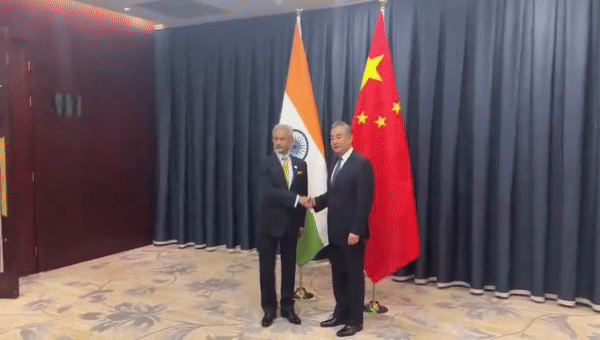By Agencies
Astana (Kazakhstan), July 4: External Affairs Minister S Jaishankar met his Chinese counterpart Wang Yi on the sidelines of the Shanghai Cooperation Organisation (SCO) Heads of State summit in Astana on Thursday.
The two leaders could be seen having a warm handshake, as they chatted for a while before posing for a picture together.
India and China have been in a military standoff for the last three years since May 2020, when the Chinese tried to aggressively alter the status quo on the Line of Actual Control.
Amid border tensions, in March this year, India and China exchanged views on ways of achieving complete disengagement and resolving the issues along the Line of Actual Control (LAC) in the Western sector of India-China border areas.
Meanwhile, Jaishankar is leading the Indian delegation in Kazakhstan to attend the 24th Meeting of the SCO Council of Heads of State (SCO Summit).
Upon his arrival in Astana, Jaishankar was welcomed by Kazakhstan Deputy Foreign Minister Alibek Bakaye.
Jaishankar also visited Pushkin Park in Astana on Wednesday, where he paid tribute to the statue of Mahatma Gandhi accompanied by members of the Indian community. Jaishankar thanked Kazakhstan’s Deputy PM for the hospitality and arrangements for the SCO Council of Heads of State Summit.
The two leaders also exchanged views on regional and global issues.
“Delighted to meet DPM & FM Murat Nurtleu of Kazakhstan in Astana today. Thanked him for the hospitality and arrangements for the SCO Council of Heads of State Summit. Discussed our expanding Strategic Partnership and India’s increasing engagement with Central Asia in various formats. Also exchanged views on regional and global issues,” EAM Jaishankar said in a post on X.
During the SCO Summit, the leaders are expected to review the organization’s activities over the past two decades and discuss the state and prospects of multilateral cooperation, according to the Ministry of External Affairs (MEA) earlier press release. The leaders are also expected to discuss issues of regional and international importance.
